By EricJames Ochigbo
President of the Senate, Godswill Akpabio has pledged the commitment of the Senate toward inclusion of more women in governance in the country.
Akpabio said this at the International Conference on Women in Governance, organised by the National Institute for Legislative and Democratic Studies (NILDS) in Abuja on Wednesday.
He said that the outcome of the 2023 General Election, in terms of the number of women elected into various positions, showed that more work needed to be done and that past efforts had not yielded the desired results.
“In recognition of this strategic importance of women, the renewed hope agenda of President, Bola Tinubu, provides for women empowerment.
“The policy document recognises that if Nigeria is to reach its fullest potential, every segment of the population must be given a fair chance to make their best contribution to the well-being and advancement of the country.
“The agenda highlights the specific need for social inclusion and political empowerment. In this regard, the President will work with the National Assembly to pass a law that promotes greater employment for women in all government offices, ministries and agencies to increase women’s participation in government to at least 35 per cent.
“The legislation, when prepared, will also mandate the Federal Executive to reserve a minimum number of senior positions for women and the private sector shall also be strongly encouraged to do likewise,” he said.
Akpabio added: “It is gratifying to note that the president has already achieved some milestones, with women constituting about 20 per cent of the newly inaugurated cabinet.
“Although this falls short of the 35 per cent affirmative action, it is a significant improvement from the previous cabinet, which had 15 per cent women representation.
“In the coming months and years, the National Assembly will work closely with Mr. President to achieve the lofty goals outlined in his agenda.”
He said that the senate would ensure that commercial banks in Nigeria provided support to women-owned businesses through concessionary loans and incentive schemes.
He said fighting domestic violence and abuse through specialist police units, promoting educational parity for the girl-child and improving the conditions of disadvantaged women through social intervention programmes would be prioritised.
In his remarks, Speaker of the House of Representatives, Tajudeen Abbas assured that House would do everything possible within its powers to ensure that women’s proper representation were brought to light.
He said that he understood the frustration of women following the rejection of agenda bill by the 9th house of assembly.
“That bill failed to pass was because of the challenges of finding working modalities but the house will be revisiting the bill as part of our legislative agenda.
“We believe that working together with the women on stakeholders, we should be able to have a law that will benefit the women and all Nigerians to improve governance in Nigeria,” he said.
Earlier, the Director-General of NILDS, Prof. Abubakar Sulaiman said that conference was convened in line with the mandate of the institute to deepen democratic culture and promote political participation and inclusion.
He said that the institute had consistently collaborated with partners, including UN Women, to advance this mandate.
“The last two years, they have heightened advocacy for gender budgeting to ensure that public resources are used to increase gender equity.
“Since its establishment in 2011, we have undertaken a gender audit of the National Assembly and developed a Gender Mainstreaming Manual for the Nigerian legislature.
“The institute’s Strategic Plan (2019-2023) specifically outlines the institute’s commitment to promoting a gender-sensitive legislature in Nigeria and fostering gender equality.
“In line with this, we have generated and published numerous research studies that respond to women’s needs and interests in government structures, operations, methods and work processes,” he said.
Sulaiman said that the institute had consistently invested in capacity development for female candidates, female members of the National Assembly and State Houses of Assembly and other women stakeholders. (NAN)




